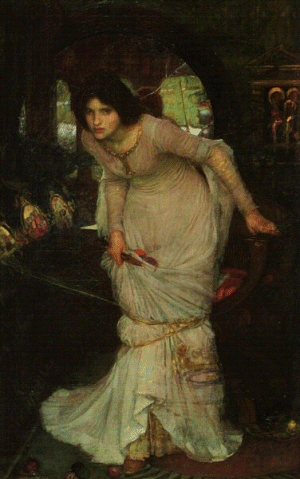|
|
|
.
.
.
.
.
.
.
.
|
By the margin, willow-veil'd Slide the heavy barges trail'd By slow horses; and unhail'd The shallop flitteth silken-sail'd Skimming down to Camelot: But who hath seen her wave her hand? Or at the casement seen her stand? Or is she known in all the land, The Lady of Shalott?
Only reapers, reaping early |
Part II
There she weaves by night and day
And moving thro' a mirror clear |

|
Sometimes a troop of damsels glad, An abbot on an ambling pad, Sometimes a curly shepherd-lad, Or long-hair'd page in crimson clad, Goes by to tower'd Camelot; And sometimes thro' the mirror blue The knights come riding two and two: She hath no loyal knight and true, The Lady of Shalott.
But in her web she still delights |

|